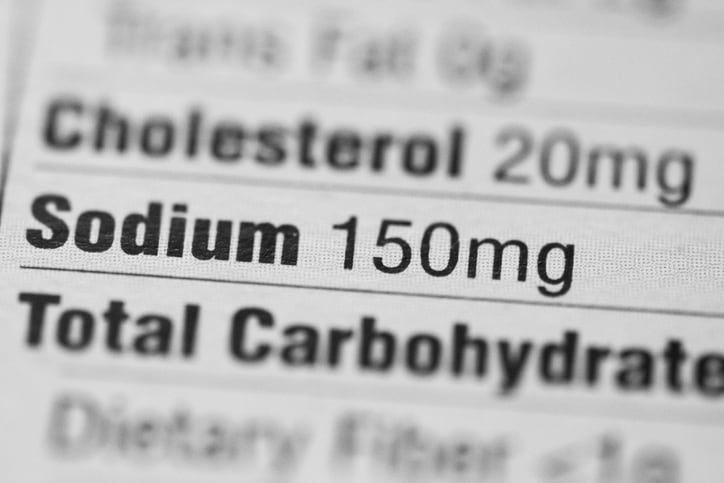Salt, or ‘white death’ as it is colloquially known among health advocates, is a contentious ingredient.
Both a food preservative and flavour enhancer, salt is a staple used by food and beverage manufacturers, as well by chefs and home cooks in the kitchen.
However, elevated dietary salt levels are known to increase people’s risk of high blood pressure, hypertension, heart disease and stroke.
According to the World Health Organization (WHO), most people consume around 9-12g of salt per day – close to twice the recommended maximum intake.
Yet the UN agency estimates 2.5m deaths could be prevented each year if global salt consumption was reduced to the recommended level. Indeed, reducing salt intake is regarded as one of the most cost-effective measures countries can take to boost population health outcomes.
For food companies, health campaigners, and governments, this begs the question: are consumers willing to reduce their dietary salt intake?
If given the option, would shoppers opt for salt-reduced versions of conventional food products? And what role could a ‘salt-reduced’ front-of-pack label play in all this?
These questions have also plagued researchers in northern Europe, who conducted a web survey to better understand such consumer behaviour.
According to research lead Trine Mørk, from Denmark’s Aarhus University, the survey was prompted by an increased interest in ‘if and how’ a salt label could drive increased consumption of salt-reduced products.
“If we found that such a label could move some of the sale to salt-reduced products, it could motivate industry to reformulate more products,” she told FoodNavigator. “To this day, we do not have a front-of-pack salt label in the Scandinavian countries.”
The study
In June 2016, 1030 Danish citizens responded to a questionnaire put together by Mørk and her team.
The survey asked questions relating to daily salt usage, knowledge of salt recommendations, sources of salt intake, general health interest, social and personal norms about dietary salt, perceived behavioral control, knowledge of salt content in food products, and willingness to purchase salt-reduced food products.
“We found that consumers are willing to try salt-reduced food products even if they have no intention to reduce their dietary salt intake,” Mørk told this publication.
Indeed, the majority of respondents (66.8%) expressed no intentions to change their dietary salt intake. 12.6% indicated they intended to alter their salt intake, and 20.6% said they had already implemented a change.
“We also found that utilitarian food products were more likely to be chosen in a salt-reduced variant than a hedonic product, however people did say they were willing to choose hedonic salt-reduced products,” the lead author continued.
In this instance, utilitarian products refer to those described as more functional, practical, and plain. The study categorised olives, bacon, butter, canned fish, and tomato sauce, among others, as utilitarian.
Conversely, hedonic products – such as crisps, biscuits, white bread and cake – refer to items that are more fun, enjoyable, and pleasurable.
The study also revealed that when respondents were educated about the negative consequences of excessive dietary salt intake, and had personal norms about eating less salt, they demonstrated a high willingness to purchase a wide variety of reduced salt products, Mørk continued.
What does this mean for policymakers?
Findings suggest that most consumers are willing to purchase salt-reduced food products, even if they don’t have a salt reduction goal.
According to Mørk, this data could help health agencies and government better understand the determinants for consumers’ willingness to purchase such products, “which can be [influenced] by increasing people’s knowledge about salt – even if this knowledge does not increase their intentions to reduce their salt intake”.
Health campaigners working on salt reduction strategies could also leverage the researchers’ findings, she continued, to determine which consumers to target.
“All in all this indicates that if health authorities wish to influence dietary salt intake, it may be effective to focus on the point of purchase in stores [such as ‘reduced-salt’ labelling], while also undertaking general campaigns to urge and educate consumers to think about their own salt intake.”
And the food industry?
The responsibility for the reduction of dietary salt should not, however, fall solely on public health agencies, nor on individual consumers. “It demands cooperation among all stakeholders”, suggested the research team.
The fact that respondents who expressed no intention in lowering their dietary salt intake still portrayed a willingness to purchase salt-reduced products demonstrates that “food producers will be able to find customers for their salt-reduced food products, even if the population claims to have no intention to change their salt intake”, said Mørk.
The researchers commended that the food industry has made ‘considerable progress’ in providing low-salt options through reformulation. However, they said salt-reduced food products need to be promoted as such to increase adoption.
“Marketers also must develop communication strategies to promote products with lower salt content.
“To limit dietary salt intake, multiple stakeholders must share the responsibility jointly.”
Source: Appetite
Determinants of intention to reduce salt intake and willingness to purchase salt-reduced food products: Evidence from a web survey
Published: 1 August 2019
DOI: https://doi.org/10.1016/j.appet.2019.04.018
Authors: Trine Mørk, Liisa Lähteenmäki, Klaus G. Grunert





